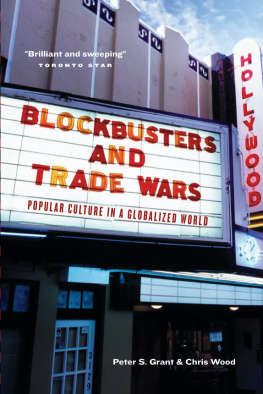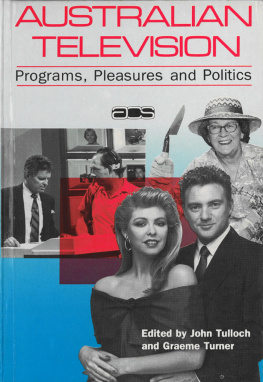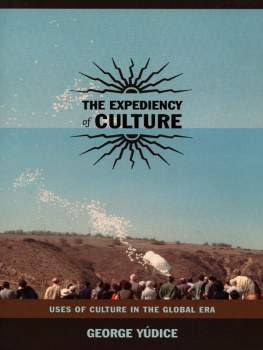Praise forBLOCKBUSTERS AND TRADE WARS
Timely and readable Whats most refreshing about Blockbusters and Trade Wars is the cornucopia of factual surprises revealed by its research.
GLOBE AND MAIL
Perhaps the most compelling and certainly the best informed case for Canadian insistence on a cultural exception.
TORONTO STAR
This book offers a wealth of perceptive insights into the issues raised by the impact of globalization on the production, consumption and export of popular culture. It is timely, provocative and very well-researched. Highly recommended.
LORD DAVID PUTTNAM, CBE,producer of Chariots of Fire, Midnight Express and The Killing Fields
This book is distinguished by its thorough international coverage of national policies towards broadcasting and its recognition of the economic forces that shape the effects of these policies.
RICHARD E. CAVES, Professor of Economics, Harvard University
This fascinating book, chock full of statistics and figures from around the world, is the most ambitious of its kind to be written in Canada belongs on the shelf of everyone interested in the future of Canadian cultural industries.
WINNIPEG FREE PRESS
[This book] is nothing less than the new reference bible on the issue of popular culture and globalization.
LE DEVOIR
A superior examination of global media markets, and the policies that create them. I cannot recommend this book highly enough.
ROBERT W. MCCHESNEY, author ofRich Media, Poor Democracy: Communications Politics in Dubious Times
An impressive and comprehensive factual and intellectual tool kit This book is a must for all broadcasting regulators, industry players and interested citizens.
CAROLE TONGUE, former member, European Parliament
Peter S. Grant & Chris Wood
BLOCKBUSTERS AND TRADE WARS
POPULAR CULTURE IN A GLOBALIZED WORLD
Douglas & McIntyre
VANCOUVER / TORONTO / BERKELEY
Copyright 2004 by Peter S. Grant and Chris Wood
First paperback edition published in 2005
First U.S. paperback edition published in 2006
First ebook edition published in 2011
All rights reserved. No part of this book may be reproduced, stored in a retrieval system or transmitted, in any form or by any means, without the prior written consent of the publisher or a licence from The Canadian Copyright Licensing Agency (Access Copyright). For a copyright licence, visit www.accesscopyright.ca or call toll free to 1-800-893-5777.
Douglas & McIntyre Ltd.
2323 Quebec Street, Suite 201
Vancouver, British Columbia
Canada V5T 4S7
www.douglas-mcintyre.com
Cataloguing data available from Library and Archives Canada
ISBN 978-1-55365-009-6 (cloth)
ISBN 978-1-55365-108-6 (pbk.)
ISBN 978-1-926706-79-5 (ebook)
Editing by John Eerkes-Medrano
Cover design by Peter Cocking
Cover photograph by Alastair Bird
Distributed in the U.S. by Publishers Group West
We gratefully acknowledge the financial support of the Canada Council for the Arts, the British Columbia Arts Council, and the Government of Canada through the Book Publishing Industry Development Program (BPIDP) for our publishing activities.
CONTENTS
A S WE START a new millennium and notice the signs of globalization around us, there is a curious paradox. In the past few years, we have witnessed an unparalleled expansion in the distribution of books, television programs and other cultural products worldwide. On its face, this would seem to augur well for cultural diversity. There are seemingly more ideas, more pluralistic expression.
But behind this facade of apparent pluralism are disturbing signs. There is a greater concentration of sources of expression. Five huge record companies control more than 70 per cent of dollar volume in sound recordings. Hollywood dominates cinema film screens and floods local television with hard-to-resist drama. The concentration of media is growing apace around the world. It is harder and harder for independent producers to survive, whether in the United States or in any country where concentration is increasing. The distribution of cultural products is often in the hands of gatekeepers who reduce choice rather than expand it. In the book field, shorter shelf life and tightened supplier margins from big-box retail stores have increased the sales of bestsellers, led to publisher consolidation and hurt mid-list titles.
In the face of these problems, the publics perception is that nothing can be done. Globalization, aided by borderless technologies like satellite TV and the Internet, has seemingly rendered governments helpless. Quotas are largely considered ineffective or easy to avoid. And in any event, governments arguably cannot be involved in regulating cultural industries without compromising freedom of expression or breaching international trade obligations.
Are these perceptions well founded? Or are they misplaced?
As a Canadian lawyer practising in the area of communications law and cultural policy for the past thirty years, I have had occasion to study these issues in a very practical way. I have acted for broadcasters, satellite and cable TV operators, book publishers, music labels, magazine publishers, film and television producers, talent guilds and copyright collectives.
Canada provides an interesting case study. If globalization can be described as a process in which borders are eliminated and multinational companies can extend their reach across geographical boundaries, Canada has encountered this in the broadcasting field since the 1950s. The signals of U.S. television stations along the U.S.Canadian border were freely available off the air to millions of Canadian homes in the 1950s and were permitted to be carried into homes of cable TV subscribers in communities across Canada in the 1970s. This had a profound effect on Canadian communications and cultural policy and forced Canada to confront, far earlier than most other countries, many of the issues now raised by satellite broadcasting and the global reach of the Internet.
Perhaps as a result, Canada has also had more direct experience in trade disputes in the cultural area than has any other country. Its attempts to carve out a space for its own cultural expression in the face of globalization have been challenged by its neighbour to the south on more than one occasion, and the lessons learned from these encounters provide an illuminating guide to the impact of trade law on culture.
In looking at these issues, I have focused on the field of popular culture books, magazines, records, movies and broadcasting. This is not a book about arts policy or the performing arts, although the high arts share the same talent pool and often the same media as more mass-oriented expression. In American parlance, the companies that disseminate popular culture are typically categorized as being in the entertainment or leisure industries (along with gambling and sports). The word culture is typically relegated to areas like the ballet, symphonies and other branches of the performing arts, or applied to the area of folk or traditional arts and crafts.
But it is in the area of popular culture that globalization has made its most pervasive attack on local cultural expression and led to cries of U.S. dominance. It is also the area where the economic rewards are highest for the successful company, and where those companies are most likely to resort to trade law in order to maximize those rewards.
Two other preliminary points are worth raising.
First, this book is not focused on preserving cultures or on protecting a unique cultural identity. The idea of unique cultures being frozen in time, like flies in amber, has never been realistic. Indigenous cultures are constantly changing, not only in response to outside influences, but also because of internal changes. Modernization is not the same as globalization, and this book does not support suggestions that cultures must be saved harmless from change. In fact, the world of cultural expression is vastly enriched by the free flow of ideas across borders, even when those ideas challenge local cultures. The problem addressed in this book is how to provide space and choice for both domestic and foreign popular culture, not to prohibit the latter.
Next page







